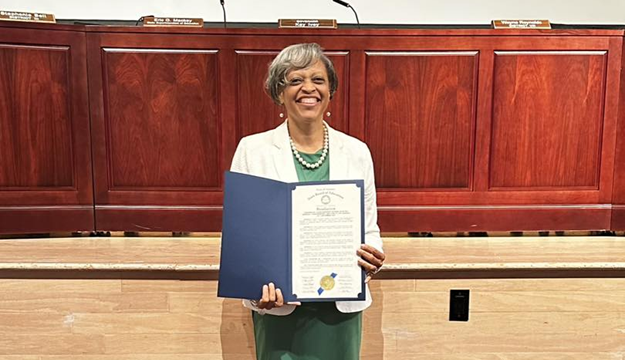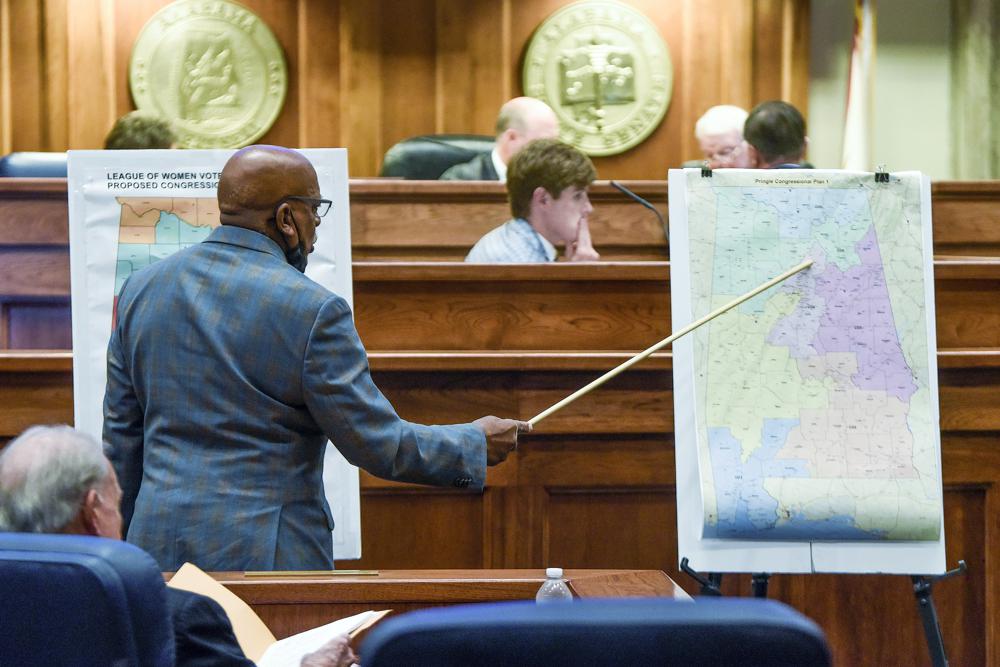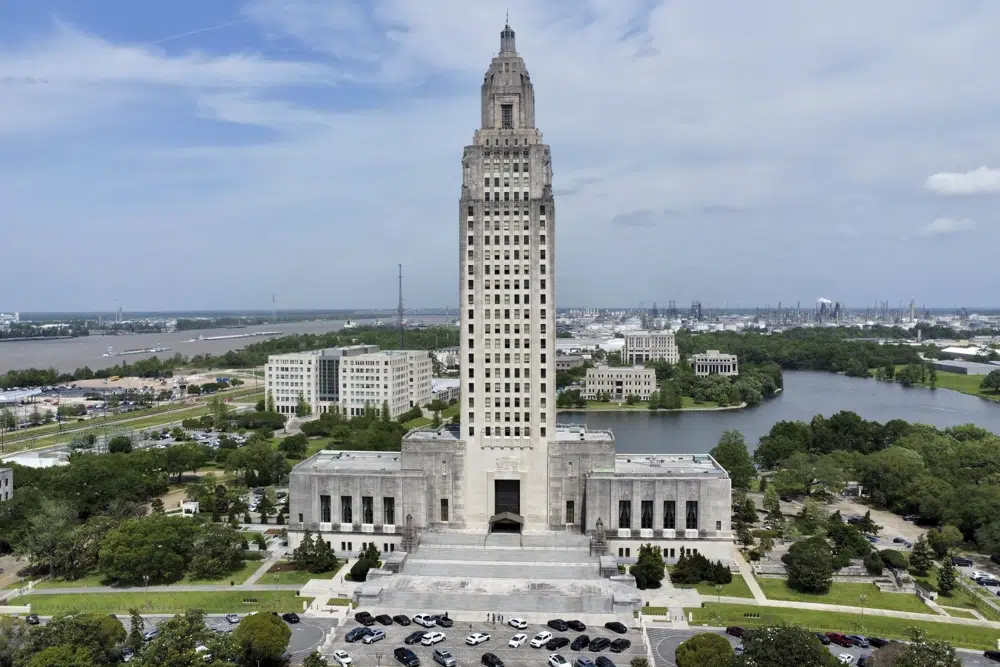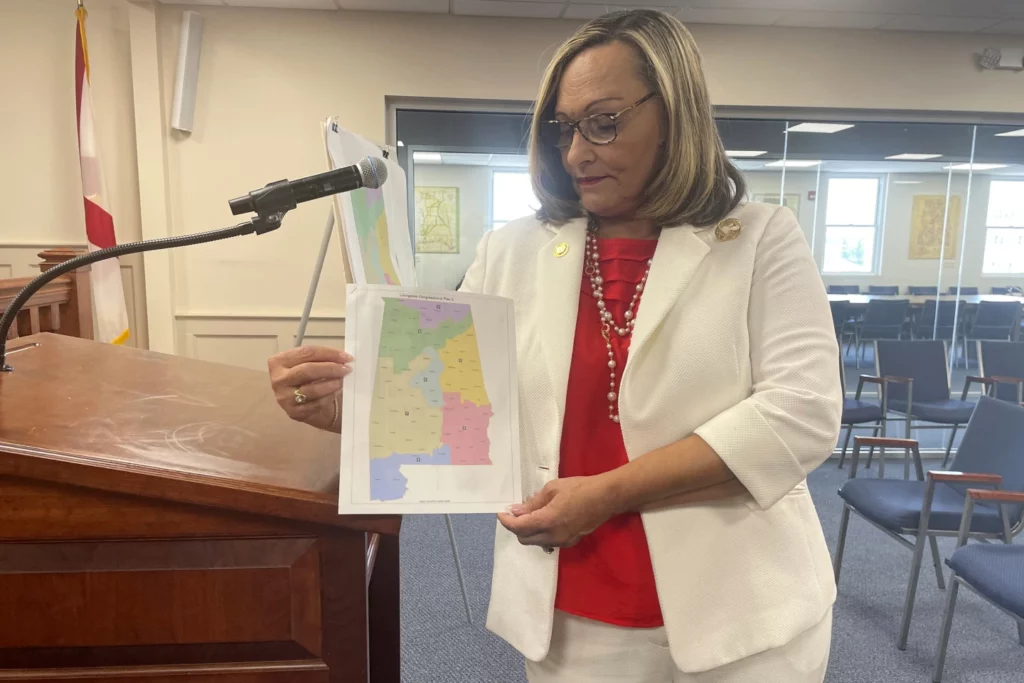State Legislators updated on the progress of the Numeracy Act

On Tuesday, members of the House Ways and Means Education Committee and the House Education Policy Committee held a joint meeting where they received an update from the Alabama State Department of Education (ALSDE) on the progress of implementing the changes in elementary math education that the Legislature ordered during the passage of the Numeracy Act. Dr. Karen Anderson is the director of ALSDE’s Office of Mathematics Improvement (OMI). She previously worked with ALSDE’s Office of School Improvement. “We are gearing up to prepare for NAEP in 2024,” Dr. Anderson said. “We are hoping to gain and improve on our stance when NAEP is given (in 2024).” Anderson said the goal is to ensure third-grade elementary students are at or above grade level in math. “An elementary school teacher should not engage in any practice that minimizes sense making and understanding of mathematics concepts,” Anderson said. “When a student is identified as having a deficiency in math, immediate action is taken,” Anderson said of the new teaching standards for math. Anderson said that the LETRS (Language Essentials for Teachers of Reading and Spelling) program used to improve reading performance is excellent, but “we are still searching for that equivalence in math.” Anderson said it establishes elementary and postsecondary mathematics task forces and provides mathematics coaches and training. Anderson said her office has had difficulty finding vendors for their new program. “We put out an RFP (request for proposal) for a fractional reasoning screener, and we got no response,” Anderson said. “Two companies said that they would develop one for us.” The Office of Mathematics Improvement has released another RFP seeking a qualified vendor. Anderson said the act also establishes the Alabama Mathematics Summer Achievement Program. “There are 18 OMI regional coordinators,” Anderson said. “Coordinators are assigned where the need is greatest.” Anderson said that currently, OMI has 83 schools receiving full and limited support. “The numeracy act provides very specific instruction for what instruction looks like in the classroom,” Anderson said. Specifically, that means there will be 60 minutes of instruction for Tier 1. “Math is not just a sit-and-get strategy,” Anderson said. “There is a real focus on classroom discourse and problem-solving. It should not be 100% sit and get.” “Immediate intervention is to be received if a math deficiency is identified,” Anderson said. “They are immediately provided with multi-tiered support.” Anderson said that she often hears folks say that they simply don’t like math. “That has really upset me,” Anderson said. “I am appalled to hear that.” Anderson said that some parents say, “I can’t do math. My father could not do math, and my son probably will not be able to do math.” Anderson said that OMI is “working to change that (mindset). Everyone can learn math.” “This is the first year that every student identified with a mathematical deficiency was invited to attend a math camp,” Anderson continued. “Thank you for providing that funding.” “Grades K-3 should have their mathematics embedded in their reading instruction,” Anderson explained. Anderson extolled the benefits of the Fun Zone program. “Fun Zone is comprised of 8 different tasks,” Anderson said. “We have trained more than 800 teachers in Fun Zone. Those that implemented Fun Zone as it was designed to be used saw improvement across the board.” “Thank you for the funding of math coaches,” Anderson said. “205 schools in all 11 regions will have math coaches. Math coaches trained by AMSTI. The Alabama coaching framework is foundational to all of the training.” “There are a number of external partnerships that we are working on,” Anderson explained. “174 areas require data under the Alabama Numeracy Act.” “We have gone across the state to provide professional development,” Anderson added, “Regional coordinators have been invited to provide a framework for what is in the law.” Anderson said there will be repercussions for schools not achieving the ALSDE goals. “If not successful after four years, even more strict consequences will be imposed,” Anderson said. “By fall of 2027, all K-5 schools will have a math coach in the school.” The House Ways and Means Education Committee is chaired by State Rep. Danny Garrett (R-Trussville). “We have to make sure that we are implementing the Numeracy Act,” Garrett said. “How is the task force functioning? Is there any areas of dissension or disagreement that we should be aware of?” Anderson replied, “No. We do have very spirited conversations, but I find those spirited conversations very uplifting.” “I have heard from people who were against the Numeracy Act to begin with who are concerned with how things are going,” Garrett said. “There is always a lot of Monday morning quarterbacking,” Anderson said. “Things are not going as quickly as I would have liked. We are getting things recommended as quickly as we can.” Anderson said that she has issued an RFP for intervention materials. “Twelve vendors have submitted packages,” said Anderson. “Are you comfortable then that there is the urgency that we seek? At this point, what do you look at to see if we are on track?” Garrett asked. “I don’t have a lot of data,” Anderson said. “The coordinators just came on in January. They have been working on building relationships.” “Is the state department ready for (school) interventions in 2025?” Garrett asked. “If we were expected now, we are not ready, but we are on track to be ready,” Anderson said. “I think we have a very good law and a very good plan,” said Garrett. Rep. Terri Collins (R-Decatur) asked about the tools available to implement the plan. “NUMBERS is not even close to LETRS,” Anderson said. Collins asked about OGAP (Ongoing Assessment Project. “OGAP is pretty sophisticated training,” Anderson said. “We have many teachers working on emergency certificates. We need to make sure that teachers have the proper pedagogy to be ready for OGAP.” “We have got ongoing meetings with our IT team,” Anderson said. “We are building structures as we need them.” Many legislators were at the Southern Legislative Conference (SLC) in Charleston, South Carolina, last week. Rep. Allen Baker (R-Brewton) said, “For those who weren’t present at SLC, Dr. Anderson- she is
Alabama House and Senate both advance GOP congressional redistricting plans

On Wednesday, the Alabama House of Representatives passed a controversial congressional redistricting plan along party lines that failed to create a second majority-minority district. Hours later, the Alabama Senate passed a similar plan that also failed to turn Alabama’s Second Congressional District into a majority-minority district. Civil rights groups are demanding that the Alabama Legislature create a second majority-minority district after the three-judge panel of the Eleventh Circuit Court of Appeals declared Alabama’s 2021 Congressional rezoning in violation of the Voting Rights Act of 1965. After initially staying the decision, the U.S. Supreme Court agreed that the Legislature’s 2021 plan denied Black Alabamians (27% of the population the ability to choose their own congressional representation). The court has ordered the state to present a new redistricting map by July 21. The National Redistricting Foundation (NRF) accused the Legislature of defying the court order by not preparing a plan with two majority-minority districts. The NRF is the 501(c)(3) affiliate of the National Democratic Redistricting Committee (NDRC), Marina Jenkins is the Executive Director of the NRF. “The maps passed by the Alabama House and Senate are in flagrant disregard of the Alabama district court’s order to enact a map with two districts in which Black Alabamians can elect a candidate of their choice, and the Supreme Court’s decision affirming the lower court,” said Executive Director Jenkins in a statement. “This shameful process, riddled with partisan schemes deployed at the expense of Black voters’ rights, has failed the voters of Alabama who deserve a fair and compliant congressional map. Time and time again, Republican legislators have shown their intentions lie solely in maintaining their own political power and silencing the constituents they are meant to represent. Neither the House nor Senate map meet the requirement of the court’s order, or the law, and will be challenged.” The plaintiffs in Milligan v. Allen that challenged the 2021 redistricting presented two maps to the court showing either two 51% Black districts or two districts that were 48% Black. The NRF has endorsed a heavily gerrymandered (along racial lines) plan that results in a 52.2% Black Second Congressional District and a 56.7% Black Seventh Congressional District. The NRF-supported plan achieved that by dividing Mobile County into a majority-Black section that would be in the new majority-minority district that would stretch from the Mississippi to Georgia state lines and an overwhelmingly White portion that would then be in the First Congressional District with nearby Baldwin County (which is overwhelmingly White and Republican). It similarly divides Jefferson and Tuscaloosa Counties along racial lines. The Seventh Congressional District is already a majority-minority district represented since 2011 by Rep. Terri Sewell – a Black Democrat. That plan also puts Congressman Jerry Carl (R-AL01) and Congressman Barry Moore (R-AL02) into the same district – the First. The Republicans in the Alabama Legislature have rejected any plan that divides Mobile County or splits Baldwin and Mobile into separate congressional districts. They argue that the Alabama Gulf Coast and the Wiregrass regions should not be divided. The Republican Legislators call their plan the Communities of Interest Plan. The House passed a version of that plan that keeps Mobile and Baldwin whole and in the First Congressional District but increases the number of Black voters in the Second Congressional District to 42.5%. The Seventh Congressional District would be 52.15% Black. The Legislative Committee on Reapportionment is chaired by State Rep. Chris Pringle – a Mobile Republican – and State Sen. Steve Livingston – a North Alabama Republican. Pringle sponsored the plan that the House of Representatives passed, while Livingston sponsored the plan that the Senate passed. Pringle insisted that even though there are more Whites than Blacks in his plan’s Second Congressional District, it would be a toss-up district that either party could win. Black legislators insisted that the only way a Black person could win a congressional race in Alabama is if the district is majority Black. In the Senate plan, the Second Congressional District would become 38.8% Black, and the Seventh Congressional District would remain majority Black. If either of the Republican plans passes the Legislature on Friday as drawn today, the plaintiffs are almost certain to reject that plan and ask the three-judge panel in Atlanta to reject the Alabama GOP plan and appoint a special master to draw the districts. To connect with the author of this story or to comment, email brandonmreporter@gmail.com.
Louisiana lawmakers overturn governor’s veto on gender-affirming care ban for transgender minors

Louisiana’s Republican-dominated Legislature overturned Democratic Gov. John Bel Edwards’ recent veto of a ban on gender-affirming care for transgender minors on Tuesday. Louisiana, where the ban is scheduled to go into effect Jan. 1, 2024, will join 20 other states that have enacted laws restricting or banning gender-affirming medical care, which includes puberty blockers, hormone treatment, and gender-reassignment surgery. Most of those states face now lawsuits, and in some places, the bans have been temporarily blocked by federal judges. Like statehouses across the country, for the last three months Louisiana lawmakers have heard and held debates over gender-affirming care — something that has been available in the United States for more than a decade and is endorsed by major medical associations. Discussions over the ban were marred by misinformation, swarmed with religious arguments, and saw hours of emotional testimony from the LGBTQ+ community At one point, during the regular legislative session, the proposed ban was presumed dead after a Republican lawmaker cast a tie-breaking vote to kill the bill. However, amid pressure from Louisiana Attorney General Jeff Landry and the Republican Party of Louisiana, the bill was resurrected and passed. Gov. Edwards used his power to veto the bill, but in return, the GOP-led Legislature gathered at the Capitol Tuesday for a one-day veto session — only the third such session since 1974. This is the second successful override — the only other being last year when lawmakers overturned Edwards’ veto of a congressional redistricting bill Republicans maintain that they are trying to protect children, while opponents argue the bill would do the opposite, leading to heightened risks of stress, depression, and suicidal thoughts among an already vulnerable group. In addition, supporters of the bill argued that the ban proactively addresses a problem that they fear could intensify — especially if minors from surrounding states, where there are bans, travel to Louisiana to seek gender-affirming care. “If we don’t pass this bill, Louisiana will become the destination for children across the entire South to undergo these life-altering and irreversible medical experiments,” Rep. Gabe Firment, the Republican who authored the bill, said. Those in Louisiana’s LGBTQ+ community say gender-affirming care in the state is not as easily accessible as conservatives make it seem, and the problem being presented is unfounded in the state. “Proponents of this bill suggest that (the legislation is) necessary to stop physicians from attacking our children by performing these sex change surgeries. This is simply not happening in Louisiana,” Rep. Jason Hughes, a Democrat, said Tuesday. Hughes pointed out a report by the Louisiana Department of Health that showed just a few dozen minors received gender-affirming care between 2017 and 2021 and that there have been zero gender-affirming surgeries. The data only factored in Medicaid-enrolled youths. In order to override the governor, a two-thirds approval from both the House and Senate is required. The GOP currently holds a two-thirds majority in both chambers. The override had the votes needed, with a few Democrats siding with Republicans — turning the bill into law, pending any possible court battles that may block or delay the ban. Louisiana joins a growing list of states that have enacted bans. But opponents say they are confident that courts will find the laws unconstitutional and strike them down — similar to what has been seen in Arkansas, Alabama, and Indiana. Louisiana lawmakers also attempted to overturn two other controversial LGBTQ+ bills that Edwards vetoed; a “Don’t Say Gay” bill that broadly bars teachers from discussing gender identity and sexual orientation in public school classrooms, and a measure requiring public school teachers to use the pronouns and names that align with what students were assigned at birth. Both attempts were unsuccessful and, as a result, will not become law. Louisiana’s culture divide over LGBTQ+-related legislation echoes what has been seen in GOP-led statehouses across the country. Bills targeting transgender people have topped conservative agendas, and LGBTQ+ advocates say a dangerous and blatant attack is happening on their community. This year alone, more than 525 anti-LGBTQ+ bills were introduced in 41 states, according to data collected by the Human Rights Campaign, a gay rights organization. Republished with the permission of The Associated Press.
Attorneys general challenge SEC’s stock buyback rule

Utah Attorney General Sean D. Reyes led 14 other states in filing an Amicus Brief on July 18 in support of the U.S. Chamber of Commerce, which is challenging the Securities and Exchange Commission’s new rules on stock buyback reporting. The coalition of attorneys general pointed out in the brief, “..stock buybacks are an important, economically beneficial way companies return value to shareholders and reallocate capital. Corporate governance traditionally is a matter of state, not federal regulation, and Amici States oppose inefficient, burdensome regulations on stock buybacks.” “We are leading this coalition of states in opposition to the SEC buyback rule because the federal government again overreaches with a shortsighted and misguided policy,” Reyes said. On May 3, 2022, the Securities and Exchange Commission adopted a new rule on stock buybacks. The new rule requires daily stock buybacks to be reported on a quarterly basis reflecting detailed characteristics about the shares, the issuers – both domestic and foreign, the class of stocks, the repurchase plans, the trading plans, and compliance dates, among other details, to be filed on regulation forms. Reyes noted, “This rule will have severe consequences not only for investors and companies but for everyday Americans and retirement account holders. We applaud the advocacy of the U.S. Chamber in this matter and join with it in standing up for the people of America.” On May 12, 2023, the U.S. Chamber of Commerce, the Texas Association of Business, and the Longview Chamber of Commerce sought to stop the SEC from implementing the rule in a lawsuit filed with the U.S. Court of Appeals for the Fifth District. “Stock buybacks play an important role in the functioning of healthy and efficient capital markets,” said U.S. Chamber Executive Vice President and Chief Policy Officer Neil Bradley. “The SEC’s stock buyback rule doesn’t protect investors. Instead, it puts the thumb on the scale to discourage buybacks despite the fact that the repurchasing of shares improves returns for savers and investors across the economy.” The coalition believes that the SEC’s rule will make buyback programs of companies less attractive as it forces a public disclosure of sensitive financial information about companies, and the strategies and reasoning behind their buyback decisions. “Research has found that buybacks save investors hundreds of millions annually by stabilizing prices and reducing risk,” the Utah Office of the Attorney General stated. Disclosing company strategies “may provide competitors with critical insights or (become) fodder for lawsuits.” That concern which may cause companies to reduce buyback programs is a risk acknowledged by the SEC’s statement “the potential legal risk stemming from such disclosures, and the potential costs of leaking valuable private information to competitors that may infer proprietary information about the issuer,” can be derived from reports. The brief presents two arguments against the SEC rule: Joining Utah on this brief are the States of Alabama, Arkansas, Florida, Georgia, Idaho, Indiana, Iowa, Kansas, Kentucky, Louisiana, Mississippi, Missouri, Montana, Nebraska, New Hampshire, North Dakota, Ohio, Oklahoma, South Carolina, South Dakota, Tennessee, Texas, Virginia, West Virginia, and Wyoming. Republished with the permission of The Center Square.
Police cast doubt on Carlee Russell’s kidnapping claim after reporting toddler on an Alabama highway

Police in Alabama cast doubt Wednesday on the story of a woman who set off a frantic search when she disappeared for two days after calling 911 to report a toddler wandering on the highway. Carlee Russell told investigators she was abducted and forced into a car Thursday, but they have been unable to verify her account, police said. The 25-year-old’s return home Saturday prompted intense speculation about where she had been and what had happened to her. Carlee Russell’s mother, Talitha Russell, told NBC’s “Today” show on Tuesday that her daughter was abducted and fought for her life when she disappeared. But Hoover Police Chief Nick Derzis cast doubt on that account at a news conference, saying detectives were still investigating her whereabouts, but had so far been “unable to verify most of Carlee’s initial statement.” She told detectives she was taken by a man who came out of the trees when she stopped to check on the child, put in a car and an 18-wheel truck, blindfolded, and held at a home where a woman fed her cheese crackers, Derzis said. At some point, Carlee Russell said she was put in a vehicle again but managed to escape and run through the woods to her neighborhood. In the days before her disappearance, she searched for information on her cellphone about Amber Alerts, a movie about a woman’s abduction and a one-way bus ticket from Birmingham, Alabama, to Nashville, Tennessee, departing the day she disappeared. Her phone also showed she traveled about 600 yards while telling a 911 operator she was following a 3- or 4-year-old child in a diaper on the side of the highway, Derzis said. She has not talked to investigators a second time. “I do think it’s highly unusual the day that someone gets kidnapped that seven or eight hours before that they’re searching the internet, Googling the movie ‘Taken’ about an abduction,” Derzis said. “I find that very, very strange.” Her family told police she was traumatized and not ready to talk again, he said. “As you can see, there are many questions left to be answered, but only Carlee can provide those answers,” he said, later adding, “We want to know the truth.” Talitha Russell told “Today” her daughter was not in a “good state” when she got back and needed medical care. She said her daughter gave detectives a statement so they could “continue to pursue her abductor.” “There were moments when she physically had to fight for her life, and there were moments when she had to mentally fight for her life,” Talitha Russell said. Police said Tuesday that detectives did not uncover any evidence of a toddler walking on the interstate. Surveillance video from the Russells’ neighborhood showed Carlee Russell walking down the sidewalk alone before arriving at her home. She was conscious and talking when first responders arrived, and later treated and released from a hospital, police said. Police have said Carlee Russell called a 911 operator Thursday night and then a relative and told both of them she saw a toddler in a diaper on the side of Interstate 459 and was stopping to check on him. Police played the 911 call at Wednesday’s news conference. When officers arrived at the location, they found her car, cell phone, and wig but were unable to find her or a child in the area. Talitha Russell told al.com last week that her daughter was headed home after leaving work and stopping to get food. Carlee Russell was on the phone with her brother’s girlfriend when they lost contact. “My son’s girlfriend heard her asking the child, ‘Are you OK?’ She never heard the child say anything, but then she heard our daughter scream,’’ Talitha Russell said. “From there, all you hear on her phone is background noise from the interstate.” A single witness reported possibly seeing a gray vehicle and a man standing outside Carlee Russell’s vehicle, police have said. Police said Tuesday that she also stopped for snacks on the way home, but none of the food was found in her car or with her cell phone and wig. Hoover is about 10 miles (16 kilometers) south of Birmingham. Republished with the permission of The Associated Press.
Black lawmakers say Alabama GOP’s proposed new congressional map insults the Supreme Court

Alabama Republicans advanced new congressional lines Wednesday, a proposed map that Black lawmakers called an insult after the U.S. Supreme Court ordered the legislature to redraw districts to give Black voters a greater voice in elections. The House of Representatives voted 74-27 to approve the GOP plan, which does not establish the second majority-Black district sought by plaintiffs who won the Supreme Court case. Instead, the GOP would increase the percentage of Black voters to 42% in the district. That’s enough, GOP lawmakers said, to consider it a political swing district — where either a Republican or Democrat could get elected — in compliance with the court. The bill now moves to the Alabama Senate. “This is really a slap in the face, not only to Black Alabamians, but to the Supreme Court,” Rep. Barbara Drummond, D-Mobile, said during the floor debate. Rep. Prince Chestnut, a Democrat from Selma, said, “Once again, the state decided to be on the wrong side of history.” “We’re fighting the same battles that they were fighting 100 years ago, 50 years ago, 40 years ago, right here today,” Chestnut said. “Once again, the (Republican) super majority decided that the voting rights of Black people are nothing that this state is bound to respect. And it’s offensive. It’s wrong.” State lawmakers face a Friday deadline to adopt new lines after the U.S. Supreme Court in June upheld a finding that the current state map — with one majority-Black district out of seven in a state that is 27% Black — likely violates the federal Voting Rights Act. Republican House Speaker Pro Tempore Chris Pringle argued that the proposed lines satisfy the court requirement to provide greater “opportunity” to Black voters. The GOP-backed House plan would increase the percentage of Black voters in the 2nd Congressional District, now represented by Republican Barry Moore, from about 31% to 42.4%. “We’ve drawn a district that provides an opportunity for the minorities to elect a candidate of their choosing,” Pringle said. “The court said we had to provide an opportunity, and that’s what that district does.” A group of voters who challenged the existing congressional plan said white Republicans drew the map “to maintain power by packing one-third of Black Alabamians” into a single majority-Black district while leaving lopsided white majorities in every other district. Alabama now sends one Black congresswoman to Washington — Rep. Terri Sewell, whose 7th congressional district is majority Black — and six white Republicans. The appellate ruling that struck down the existing congressional map said Alabama should have “either an additional majority-Black congressional district, or an additional district in which Black voters otherwise have an opportunity to elect a representative of their choice.” The language reinforced by the Supreme Court specified that a new map should include two districts in which “Black voters either comprise a voting-age majority or something quite close to it.” Black lawmakers said Wednesday that history shows that Black candidates generally don’t win in Alabama unless they run in a majority-Black district. “We’ve been held back too long. We’re human beings. We’re Alabama citizens. We work. We do things, but we don’t have the representation that we need,” said Rep. Pebblin Warren, a Democratic lawmaker from Tuskegee. Republicans hold a lopsided majority in the Alabama Legislature and will control what ultimately passes. Representatives on Wednesday voted down an effort by Democrats to bring up a plan, backed by plaintiffs who won the Supreme Court case, that would create a second majority-Black district. The Alabama Senate planned to vote later Wednesday on a proposal that’s similar but would put even a lower percentage of Black voters in the 2nd congressional district — 38.31%. Once a new GOP map passes, the fight will shift quickly back to the courts. Republicans, who have been resistant to creating a Democratic district, are wagering that they’ll be successful in a second round of appeals. The three-judge panel could step in and draw up its own plan if they deem it unacceptable. “You can save your time. You can save your money because we’re going to have a special master drawing this map,” Rep. Chris England, D-Tuscaloosa, said. Republished with the permission of The Associated Press.

